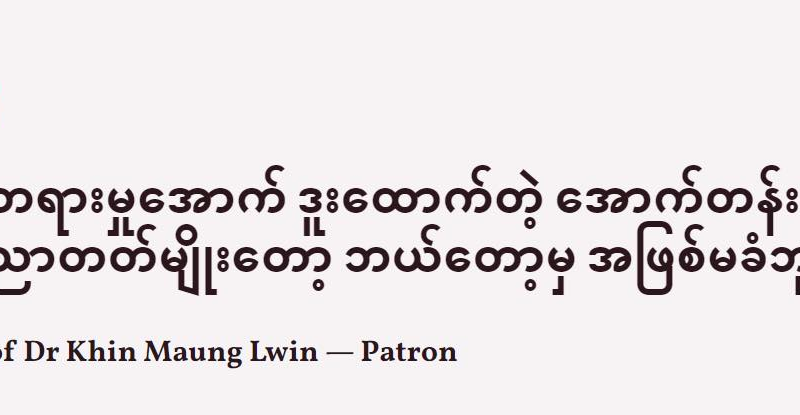Summary of News
- NUG ministers participate in the Profile Change Campaign to honour women’s leadership, strength and participation in the spring revolution
- NUG Human Rights Minister holds talks with United Nations High Commissioner for Human Rights on Myanmar issues
- NUG Minister of Commerce Daw Khin Ma Ma Myo participates in World Bank’s Global Fragility Forum 2024
- “Military and political alliance between EROs and PDFs can defeat the military junta”
- Timor-Leste Prime Minister expresses solidarity with Myanmar’s struggle against military dictatorship
- NUG Representative expresses gratitude to Timor-Leste Prime Minister for his supportive speech at Myanmar People’s Summit
- Over 140,000 people displaced in Rakhine State and Chin State’s Paletwa
- Military conducts airstrikes in Taze Township, Sagaing Region
- Allied revolutionary forces counterattack junta-backed militia column led by Monk Wah Thawa, four casualties reported
- Arakan Army seizes last junta base in Ponnggyun, LIB-550; high-ranking officers and multiple junta members killed in battle
1. NUG ministers participate in the Profile Change Campaign to honour women’s leadership, strength and participation in the spring revolution
NUG Ministers, including Union Minister Dr. Zaw Wai Soe, Union Minister Dr. Tu Hkawng, Deputy Minister Ja Htoi Pan, Deputy Minister Dr. Sai Khaing Myo Tun, and Deputy Minister Khun Baham Hta, are participating in the Profile Change Campaign in honour of women’s leadership, strength, and participation.
The Ministry of Women, Youth, and Children Affairs is organising social media initiatives as part of International Women’s Day (IWD) 2024 under the theme ‘Invest in women: Accelerate progress’ to recognise and celebrate the sacrifices, resilience, and bravery of women who are actively involved in the fight for a federal democratic union and the movement to dismantle military rule during the ongoing Spring Revolution.
To respect and honour the leadership, strength, and participation of women in difficult and challenging times, the public is also encouraged to participate in the Profile Change Campaign, and the steps on how to participate are detailed on the social media of the Ministry of Women, Youth and Children Affairs.
2. NUG Human Rights Minister holds talks with United Nations High Commissioner for Human Rights on Myanmar issues
Union Minister for Human Rights U Aung Myo Min had a meeting with United Nations High Commissioner for Human Rights Mr. Volker Turk on March 4 at the Office of the High Commissioner in Geneva.
During the discussion, Union Minister U Aung Myo Min welcomed the incorporation of more meaningful and effective measures to cut off weapons and financial support to the terrorist military junta in the report submitted to the 55th session of the Human Rights Council. The report, presented during the council session, outlined opportunities for the international community to support the people of Myanmar, emphasising the need for coordinated action by member states to deprive the weakened junta of weapons, money, and legitimacy, take steps to ensure accountability for the perpetrators of atrocity crimes, and support the efforts of leaders forging a political framework for a just, peaceful, and democratic Myanmar.
Additionally, Union Minister U Aung Myo Min emphasised the necessity of a new international approach involving direct engagement with the National Unity Government (NUG), Ethnic Resistance Organisations (EROs), and Civil Society Organisations (CSOs).
The minister also discussed the ongoing human rights situation in Myanmar, condemning the brutal killings committed by the terrorist military junta. He underscored concerns about the junta’s enforcement of a compulsory conscription law, warning of its potential to exacerbate the suffering of youth and the country’s future. This law, he noted, could legalise human rights abuses such as forced labour and the use of human shields by the military, with implications extending beyond Myanmar’s borders to neighbouring countries and the wider region. Furthermore, the minister raised alarm about the junta’s efforts to stoke religious conflict by forcing Rohingyas to join its military under the guise of conscription laws.
Moreover, the Union Minister proposed modifying the Human Rights Council’s resolution on Myanmar to incorporate more effective measures against human rights violations by the military junta, as well as to enhance the provision of humanitarian aid—both financial and technical—to democratic forces in Myanmar. The Union Minister also urged the Security Council to ensure that the resolution includes not only human rights channels but also judicial avenues to hold the military junta accountable for its atrocities.
Jaivet Ealom, an advisory member of the Ministry of Human Rights, accompanied Union Minister U Aung Myo Min during the meeting.
3. NUG Minister of Commerce Daw Khin Ma Ma Myo participates in World Bank’s Global Fragility Forum 2024
According to the Ministry of Commerce dated March 6th, Daw Khin Ma Ma Myo, Union Minister of Commerce of the National Unity Government, participated in the Fragility Forum 2024 held in Washington, D.C., from February 27th to 29th, 2024. Organised by the World Bank under the theme “Adapting and Innovating in a Volatile World,” the forum brought together leaders and experts from various sectors worldwide, including development, government, civil society, security, private sector, humanitarian, and research fields.
This three-day forum, held in a hybrid format, facilitated discussions on Fragility, Conflict, and Violence (FCV), a significant global challenge. It is projected that by 2030, nearly 60 percent of the world’s impoverished population will reside in counties classified as fragile and conflict-affected situations (FCS).
4. “Military and political alliance between EROs and PDFs can defeat the military junta”
“Military and political alliance between Bama PDF resistance and ERO resistance is capable of defeating SAC and breaking domineering power of military dictatorship,” asserted Igor Blazevic, a pro-democracy activist and program director at the Prague Civil Society Center. “After three years of enormous suffering and heroic determination, this option is not so far away any more.”
Blazevic made these remarks in a review published on March 3, in response to reports of a deal reached between the Myanmar military regime and the Three Brotherhood Alliance of Northern Shan State during their meeting in Kunming earlier this March, brokered by China.
“However, if China and Myanmar neighbours will now coerce ethnic stakeholders to abandon the Spring Revolution and make transactional deals with SAC, new opportunity will not emerge for at least next 20 years,” he cautioned. He stressed, “If SAC will not be defeated and if military will not be removed from Myanmar politics and economy, repressive, exploitative, kleptocratic, highly unequal, discriminatory, wasteful regime will reconsolidate power piece by piece. Sit tat will go from being at the edge of collapse toward renewed strength.”
5. Timor-Leste Prime Minister expresses solidarity with Myanmar’s struggle against military dictatorship
Timor-Leste’s Prime Minister Xanana Gusmão expressed unwavering support for the people of Myanmar in their struggle against the military dictatorship. Speaking at the Myanmar People’s Summit, held concurrently with the ASEAN Special Summit in Melbourne on March 4, Prime Minister Gusmão assured the Myanmar populace that they have the solidarity of Timor-Leste and its citizens.
Addressing the summit, he conveyed a message of unity, stating, “People of Myanmar! You are not alone. We stand with you. We support you until this dream can be a reality.” He urged the international community to join in amplifying their voices, emphasising the need for sustained solidarity until the suffering ends.
Prime Minister Gusmão endorsed ASEAN’s 5-Point Consensus and the appointment of Special Envoy Dr. Alounkeo Kittikhoun to facilitate engagement with all stakeholders in Myanmar. He pledged, “As Timor-Leste engages with the international community, we will continue to raise our concerns about the situation in Myanmar and advocate your rightful cause for your political freedoms, for all the people of Myanmar, including the ethnic nationalists.”
Prime Minister Gusmão affirmed support for a Myanmar-led process in resolving Myanmar’s crisis, asserting, “You must lead the process in your country.” He underscored the role of Timor-Leste and other solidarity groups in amplifying the Myanmar issue to world leaders, emphasising the importance of a process driven by Myanmar itself.
Dr. Tun Aung Shwe, Representative of Myanmar to Australia, also proposed at the event that ASEAN leaders adopt a more comprehensive approach to addressing the Myanmar issue rather than adhering rigidly to the 5-point agreement, which ASEAN has encountered challenges in implementing effectively. Emphasising the importance of sustainable peace-building processes, the NUG Representative outlined the current status of such endeavours and underscored the leadership role of the National Unity Government of Myanmar and allied organizations. The Representative advocated for the naming of this process as the “Myanmar-led Process,” excluding the Myanmar terrorist military due to its lack of future prospects. The outdated, military-centric approach is no longer viable in Myanmar.
6. NUG Representative expresses gratitude to Timor-Leste Prime Minister for his supportive speech at Myanmar People’s Summit
Dr. Tun Aung Shwe, the NUG Representative to Australia, took to social media to convey appreciation to Prime Minister Xanana Gusmão for his keynote address at the Myanmar People’s Summit in Melbourne on March 4th. On behalf of the people of Myanmar, he expressed gratitude towards Prime Minister Gusmão and Timor-Leste for their long-standing support of the Myanmar people and for recognising the National Unity Government as the legitimate government of Myanmar.
7. Over 140,000 people displaced in Rakhine State and Chin State’s Paletwa
According to the UN OCHA Myanmar’s Asia and the Pacific: Weekly Regional Humanitarian Snapshot released on March 6th, there are approximately 148,500 displaced individuals in Rakhine State and Paletwa township of Chin State. The report highlights that ongoing armed conflicts, including the junta’s airstrikes and artillery shelling, have intensified in various townships in Rakhine. This escalation has led to heightened stress among affected communities, exacerbated by the Arakan Army’s proximity to the state capital, Sittwe. The situation worsened in late February with increased shelling from junta bases in Sittwe Town. Tragically, on February 29th, a stray shell struck the downtown market in Sittwe, resulting in the reported deaths of at least 21 civilians and injuring over 30 others.
“An estimated 148,500 people have been newly displaced in Rakhine and Paletwa in Chin since the previous informal ceasefire broke on 13 November 2023. Nationwide, more than 2.7 million people are now displaced,” the report stated.
8. TNLA lifts restrictions, including curfew, in Northern Shan State towns under its control
Today, March 6, the Ta’ang National Liberation Army (TNLA) announced the lifting of restrictions, including curfews, in seven towns under its control in northern Shan State. During Operation 1027, the TNLA had enforced curfews ranging from 9:00 p.m. to 6:00 a.m. or 11:00 p.m. to 4:00 a.m., as deemed necessary, in the townships they occupied. However, citing the evident stability observed in local administrative activities, particularly in law enforcement, and with assurances of adequately prepared security plans and efficient public service and local administrative activities, the TNLA stated that previously implemented measures, including the night curfew, have now been lifted.
The seven townships under TNLA control are Namhsan, Mantong, Namhkam, Kutkai, Namtu, Monglon, and Mongngaw.
The TNLA statement emphasised their collaboration with local communities, which facilitated the smooth functioning of law enforcement and administrative endeavours during this period. “Under the administration of the Palaung State Liberation Front (PSLF/TNLA), towns and villages are upheld with strict adherence to law and order,” it stated. “As part of our commitment to fostering regional stability and peace, endeavours encompass anti-narcotics initiatives and the prohibition of gambling activities. Efforts are diligently undertaken to ensure the implementation of fair laws and administration across the region.”
Despite these efforts, the TNLA highlighted that some townships within their control had been subjected to martial law by the military junta, leading to unrest among the local populace.
On March 4, 2024, the military junta imposed martial law on three additional townships—Mantong, Namhsan, and Namtu—that are under TNLA control, bringing the total number of townships under martial law across the country since the attempted military coup in 2021 to 61. These developments occurred despite negotiations culminating in the signing of the Haigen Agreement with the junta, facilitated by a China-led initiative, leading to a ceasefire agreement on January 11, 2024.
9. Allied revolutionary forces counterattack junta-backed militia column led by Monk Wah Thawa, four casualties reported
The People’s Liberation Army (PLA) declared that they had cooperated with allied forces to launch an attack on the Pyu Saw Htee militia column led by Monk Wah Thawa, which was returning to Kanbalu from Taze township on March 5.
The Pyu Saw Htee militia column, backed by the junta and led by Monk Wah Thawa, based in Kanbalu township, had joined forces with the notorious Orge Column, known for its brutal attacks on civilians. They ravaged Taze township and set villages ablaze starting February 21st, following a confrontation with revolutionary forces at the police station in Kan Htoo Ma village, Taze township, Sagaing Region. As a result, residents from over 30 villages in Taze township had been forced to flee to the jungles for safety.
Upon receiving intelligence that the Pyu Saw Htee column, consisting of approximately 150 militia members led by Monk Wah Thawa, had returned to Kanbalu around 5:00 a.m. on March 5th, the revolutionary allied forces awaited in advance. According to the PLA, the engagement occurred around 8:20 a.m. and lasted for about 20 minutes, resulting in the deaths of two to four Pyu Saw Htee members.
The operation was conducted by the PLA, TCRF-PLA, and over 40 allied forces under the No. 1 Military Command of the People’s Defence Force (PDF), including the people’s defence teams from Mon Taing Pin village, Tet Thit village, and Kyauk Taing village. No casualties were reported among the revolutionary allies.
Furthermore, the PLA reported that following the engagement, the Pyu Saw Htee column set fire to a house and seven motorcycles belonging to civilians in Thar Kay Ta village before continuing their journey.
10. Arakan Army seizes last junta base in Ponnggyun, LIB-550; high-ranking officers and multiple junta members killed in battle
The Arakan Army (AA) announced the successful capture of the 550th Light Infantry Battalion (LIB-550), the last remaining stronghold of the junta in Ponnagyun township, Rakhine State. This achievement enabled the Arakan Army to gain full control over the entire Ponnagyun township. According to the Arakan Army, the offensive against the base started on February 21 and was completed on March 4. Earlier, the Ponna Kyunt Myoma police station had fallen under the Arakan Army’s control on February 22.
Throughout the operation, the Arakan Army confirmed the elimination of a significant number of junta soldiers, including Colonel Myo Min Ko Ko, the tactical operation commander of LIB-550, Lieutenant Colonel Phyo Thu Aung, the battalion commander of the 208th infantry battalion, and Major Saw Htwe of LIB-550. Additionally, the Arakan Army seized a substantial cache of weapons and ammunition, along with capturing junta troops.
The Arakan Army stated that it had spared the lives of soldiers who surrendered in advance and those who surrendered during the battle by raising the white flag. These surrendered soldiers were escorted to safe custody with protection and care, along with their families.
#Credit : Radio NUG
#WhatsHappeningInMyanmar


